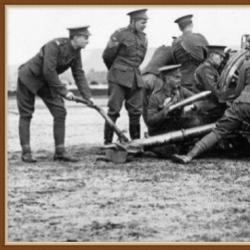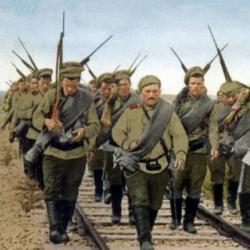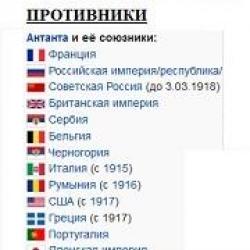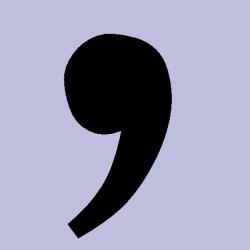If in the middle of a sentence. Punctuation marks in a complex sentence with an allied and non-union connection. When the sentence is simple
In complex sentences consisting of three or more predicative parts, combinations of two subordinating conjunctions (WHAT IF, WHAT WHEN, etc.) and combinations of coordinating and subordinating conjunctions (AND HOW, AND ALTHOUGH, etc.) can occur.
1. Two subordinating conjunctions in a row can occur in complex sentences with sequential subordination of subordinate clauses. Compare two sentences:
And I'm telling you What I will go with you If you will go.
And I'm telling you what if you will go, I will go with you (L. Tolstoy).
In the first example, the main part is at the very beginning ( And I'm telling you...), followed by an adjective (... I will go with you...) related to the main part. Such parts of the assumption are called first-degree clauses. The sentence ends with an adjective (... if you go), relating not to the main part, but to the first subordinate clause. Such parts of the sentence are called subordinate clauses of the second degree.
In the second case, the subordinate parts are rearranged: after the main part of the sentence, the subordinate clause of the second degree follows, and then the subordinate clause of the first degree. It was in this situation that two subordinating unions ended up next to each other: the union WHAT, with the help of which the subordinate clause of the first degree is attached, and the union IF, which attaches the subordinate clause of the second degree. In such a sentence, there is a comma between the two subordinating conjunctions.
Please note: from such a sentence, a subordinate clause of the second degree ( …if you go…) is easy to remove without destroying the entire syntactic construction: And I'm telling you that ... I'll go with you.
Now let's change this sentence a bit:
And I'm telling you what if you will go, That I will go with you.
In this example, the correlative word TO appeared in the last subordinate clause. This is the second part of the compound union IF ... THEN. As a result, there is no comma between the unions WHAT and IF. Note that here we cannot omit the second-degree clause ( …if you go…), since the sentence will retain the word TO, referring to the last part of the sentence.
It turns out that the union WHAT joins a single construction of two parts connected by the union IF ... THEN, and therefore, a comma between the words WHAT and IF is not needed. Consider two more similar sentences, only with conjunctions WHAT and WHEN.
That's because what when the car stops, your whole body slows down (A. Tolstoy).
Egor brought a remark unexpected for Levin, what when he lived with good masters, Then he was pleased with his masters (according to L. Tolstoy).
The comma between the unions WHAT and WHEN is only in the sentence where there is no word THEN.
2. In addition to complex sentences with sequential subordination of subordinate clauses, a similar situation can develop in constructions where both coordinative and subordinating relationships are used at the same time. In this case, there may be coordinating and subordinating conjunctions. Compare two sentences:
Curtain rose, And How as soon as the audience saw their favorite, the theater trembled with applause and enthusiastic shouts (Kuprin).
Curtain rose, And How only the public saw their favorite, So the theater trembled with applause and enthusiastic cries.
Please note: in both examples, AND and HOW are side by side, but only the first sentence has a comma. The fact is that in the second example, the simple union AND and the compound union HOW ... SO were nearby. The second (correlative) part of the compound union follows after the subordinate tense.
Try to remove the clause from the sentence, starting with the word HOW to the next comma. This is possible only in the first case, and in the second sentence the meaning will be destroyed, since the second part of the compound union SO will remain in the subordinate clause.
Compare two more sentences:
and although her words were familiar to Saburov, they suddenly hurt her heart (Simonov).
The woman kept talking and talking about her misfortunes, and although her words were familiar to Saburov, But they suddenly broke my heart.
In the second sentence, there is no comma between the union AND and the union ALTHOUGH, since the concessive clause is followed by the conjunction BUT, which actually takes on the function of connecting the first and third parts of the complex sentence. For this reason, in the second example, the words AND ALTHOUGH are converted into a single allied combination that does not require separation in writing with a comma.
So, you need to remember the following rules.
1. With consistent subordination, subordinating conjunctions may be nearby (WHAT and IF, WHAT and WHEN, etc.). A comma is placed between them only if there are no correlative words TO or THEN further in the sentence.
2. If in a complex sentence there are coordinating and subordinating conjunctions (AND AND ALTHOUGH, AND AND HOW, etc.), then you need to find out if after the clause there are correlative words TO, SO or another coordinating union (A, BUT, HOWEVER and etc.). A comma is placed only when these words are absent after the subordinate clause.
Exercise
- _ although no one asked himself, what does anyone care about the fact that the mayor is sleeping on the glacier, and not in an ordinary bedroom, but everyone was worried (Saltykov-Shchedrin).
The hunting sign that if the first beast and the first bird are not missed, then the field will be happy, turned out to be fair (L. Tolstoy).
She knew that if the letter was shown to her husband, he would not refuse her (according to Tolstoy).
He felt that if he stumbled, then everything would immediately go to hell (Gogol).
It always happened with Levin that when the first shots were unsuccessful, he got excited, annoyed, and shot badly all day (Tolstoy).
It never occurred to him that if he and other foreign idealists were Russians in Russia, they would be exterminated immediately by the Leninist regime (Nabokov).
In this case, the Foolovites surprised the world with their ingratitude, and as soon as they learned that the mayor was having a bad time, they immediately deprived him of their popularity (Saltykov-Shchedrin).
On the way, he ran into a changer's shop and exchanged all his large paper for small paper, and although he lost it on the exchange, his wallet grew considerably thicker (according to Dostoevsky).
In the penultimate room Andrei Filippovich met him, and although there were quite a few other faces in the room, completely strangers to Mr. Golyadkin at the present moment, our hero did not even want to pay attention to such a circumstance (Dostoevsky).
By morning the temperature had dropped, and although I was sluggish like a toad, I put on my purple dressing gown over my corn-yellow pajamas and went to the office where the telephone was (Nabokov).
It may very well be that if the forms do not match my requirements, I will abandon the legal claim (Tolstoy).
Andrei Filippovich replied to Mr. Golyadkin with such a look that if our hero had not already been completely killed, he would certainly have been killed another time (Dostoevsky).
For example, she became more and more convinced that if the general conversation was sometimes conducted in French, then this was done by conspiracy for the sake of devilish fun (according to Nabokov).
The regimental commander announced that if these scandals do not stop, then we must go out (Tolstoy).
He felt that if he admitted this, it would be proved to him that he was talking nonsense that had no meaning (Tolstoy).
Levin made the remark a long time ago that when it is awkward with people because of their excessive compliance, humility, it will very soon become unbearable from their excessive exactingness and captiousness (Tolstoy).
Yankel turned to him and said that Ostap was in the city dungeon, and although it was difficult to persuade the guards, he hoped to get him a meeting (according to Gogol).
He also petitioned for the establishment of an academy, and when he was refused, he built a movable house instead of it (Saltykov-Shchedrin) without further thought.
Even by the sound of light steps on the stairs, he felt her approach, and although he was pleased with his speech, he became afraid for the upcoming explanation ... (Tolstoy).
But their hopes did not come true, and when the fields cleared of snow in the spring, the Foolovites, not without amazement, saw that they were completely naked (Saltykov-Shchedrin).
In a word, he thoroughly studied mythology, and although he liked to pretend to be pious, in essence he was the worst idolater (Saltykov-Shchedrin).
I liked to visit them, and although I overate terribly, like all those who visited them, although it was very harmful for me, I was always glad to go to them (Gogol).
She told him to hide under the bed, and as soon as the anxiety passed, she called her maid, a captive Tatar, and gave her the order to carefully take him out into the garden and send him over the fence from there (Gogol).
The grammarians started before everyone else, and as soon as the rhetoricians intervened, they already ran away and stood on the dais to observe the battle (according to Gogol).
Can be distinguished three most dangerous alliances, when meeting with which you need to be especially careful: and yes (in meaning And ), or. And if they appear alone, then you need to keep your eyes open.
And unions or yes (in meaning And ) are not as common as union And. This union is truly omnipresent. Try experimenting: open any text (fiction, journalistic, scientific) and find a page that does not contain a single union And . You will have to work hard, spend a lot of time, and it is unlikely that your search will be crowned with success.
If you come across a dangerous alliance, this is a signal: "Danger! Take your time! Think!
So, we see: we have a sentence in which we need to punctuate. What needs to be done first? Right! Determine how many grammatical bases. If the sentence is simple - it has some punctuation marks, if the sentence is complex - others.
The "non-dangerous" conjunctions and allied words are the creatures that carry the poster: "We need a comma! (or some other punctuation mark)". For example, a, but, to, what, which, because, therefore, if etc.
But "dangerous" unions scream that they special, so for them there are separate rules for punctuation!
Let's try to put these rules together in order to make the work of all of us who study Russian easier.
The first group is complex sentences. The second group - simple sentences with homogeneous members(subjects, predicates, additions, definitions, circumstances). Each group has its own list of punctuation rules for "dangerous" unions.
Let's take them in order.
When the sentence is difficult
The rule about putting a comma in a complex sentence is very simple: if the sentences have some common grammatical or semantic elements, a comma between simple sentences is not placed before a single “dangerous” union.
These common elements can be:
1)
General minor member of the sentence. 
Ivan Ivanovich's large expressive eyes of tobacco color and a mouth somewhat similar to the letter Izhitsu. (N. V. Gogol)
Who has big eyes? Ivan Ivanovich. And whose mouth looks like the letter Izhitsu? Same with Ivan Ivanovich. The general addition applies equally to the first sentence and to the second.
Be careful! The minor member of the sentence really should be common!
Compare. At the pier, loaders are slowly doing their work, and huge liners are smoothly sailing into the ocean.
One might immediately think that at the pier is a common minor term. But then it turns out that the liners sail into the ocean at berth, but this is not so: the liners sail from berth, and movers do their job at berth. There is no common minor term, so a comma is needed.
2) General adjective.
If it wasn't for the rain, all the greenery would have dried up long ago and the earth would lie in wrinkles and cracks.
3) General main proposition.
The swallow said goodbye to Thumbelina as soon as the sun warmed and the earth melted.
If the "dangerous" union repeats, then no common members of the sentence are important - the comma is still put.
There used to be a taiga here, And there were bears, And age-old mighty trees rustled.
The union is repeated, therefore, despite the presence of a common circumstance here, simple sentences are separated by commas.
When the sentence is simple
The rule for setting a comma with homogeneous members is also simple: a comma is not placed if the union is single; if the "dangerous" conjunction is repeated, a comma is needed.
 Examples:
Examples:
1. Pine trees grew in the forest And birch.
2. They grew in the forest And pines, And birch.
3. Pine trees grew in the forest, And birch, And aspens.
4. Pine trees grew in the forest And birch, aspen And Oak trees.
Is it that hard to remember? When there are examples, schemes and rules in front of your eyes, probably not. But in the texts there are sometimes sentences in which punctuation marks can cause difficulties.
1. The temptation to put an unnecessary comma is especially great in those cases when the homogeneous members of the sentence, connected by a "dangerous" union, do not stand side by side, but are separated by other words. The more such words, the more I want to put a comma. And if we have a poetic text in front of us, then here the intonation also pushes us to put an extra comma.
Look at the following sentences, think about where you would like to put a comma.
1.
A messenger rides with a diploma
AND arrived at last.
2.
The moon ran in the darkness
From cloud to cloud And mound
Illuminated with instant brilliance.
(A. S. Pushkin)
Punctuation marks are correct, commas are not needed.
2. Pairs of homogeneous members can be homogeneous and heterogeneous.
Compare two sentences.
In summer And in winter, in the rain And in the city, at night And during the day they go to save people.
Pairs of homogeneous circumstances refer to one member of the sentence - the predicate, therefore they are separated by a comma.
Serbian writers And poets carefully And reverently collected And recorded in villages And villages folk songs and fairy tales.
All pairs of homogeneous members refer to different members of the sentence and are heterogeneous in relation to each other, therefore they are not separated by commas.
3. There can be several “dangerous” unions in one sentence, so you need to find out what work each union does, then put punctuation marks.
AND heart beats in rapture
AND resurrected for him
AND deity and inspiration
AND life, and tears, and love. (A. S. Pushkin)

Before us is a complex sentence, simple sentences are connected by a union And; in the second part we see homogeneous subjects with a repeating union And.
In the grammar of the Russian language, there are cases when we, without hesitation, quickly and accurately put punctuation marks, for example, a comma before opposing conjunctions A And But. However, there are times when slowness and care and you need to think about how the sentence is structured, what are the semantic relationships of the parts, only after that put punctuation marks. Don't forget the Russian proverb: Hurry up and make people laugh.
Good luck in learning Russian!
Do you have any questions? Don't know how to punctuate with homogeneous members?
To get the help of a tutor - register.
The first lesson is free!
site, with full or partial copying of the material, a link to the source is required.
Punctuation marks in a complex sentence with an allied and non-union connection. A complex sentence with different types of connection.
Clue. Answers to the questions: what is a complex sentence and types of subordinate clauses - you will find in tasks A24 and B6.
Rule.
The following algorithm will help to put punctuation marks in such sentences:
Trap!
If the subordinate clauses are homogeneous and there is an AND union between them, then the repeating subordinating union is skipped before the second clause.
[This time I was already happy] , ( When the bell rang) And (Yurka burst into me).
It can be easily restored from context:
This time I myself was delighted when the bell rang and When Yurka burst into me).
This sentence follows the pattern: , () AND/OR ().
1. A comma at the junction of two unions.
A comma at the junction of unions can be in two cases:
When between two bases connected by coordinating unions, a subordinate clause is wedged, depending on the second base.
With sequential subordination of subordinate clauses, when the second subordinate clause depends on the first, but at the same time requires a position in front of it.

Rule.
Action algorithm.
1. Highlight grammatical foundations.
2. Select unions and determine whether they are coordinating or subordinating.
3. Determine the main and subordinate clauses (main - those from which the question is asked; subordinate - to which the question is asked).
4. Determine the boundaries of simple sentences that are part of a complex one (unions are often indicate to the beginning of new grammatical foundations!).
5. Put down punctuation marks.
Parsing the task.
Which answer option correctly indicates all the numbers that should be replaced by commas in the sentence?
Lucy was gently persistent (1) and (2) although it was difficult to remember everything (3) gradually the old woman told (4) how it was.
First, let's define the grammatical foundations and highlight which of them are main, which are subordinate.
[Lucy was mildly persistent] and [(although it was hard to remember o) gradually the old woman told] (how it was).
Thus, we get:
According to the rules, in a complex sentence with heterogeneous clauses, all grammatical bases must be separated from each other by commas.
BUT! In this sentence there is a junction of unions AND ALTHOUGH. We read the offer. In its second part, there is no continuation of the union THEN, SO, BUT, therefore, a comma is placed between the unions: AND, ALTHOUGH.
[Lucy was gently insistent], (1) and, (2) [(although it was hard to remember o), (3) gradually the old woman told] , (4) (how it was).
The correct answer is option #2.
Practice.
1. In which answer option are all the numbers correctly indicated, in the place of which commas should be in the sentence?
It was getting dark (1) and (2) when we entered a sparse birch grove (3), the white trunks seemed to us bright paper strips stuck to the lilac dusk.
1) 1, 2, 3 2) 2, 3 3) 3 4) 1, 2
2. In which answer option are all the numbers correctly indicated, in the place of which commas should be in the sentence?
At the fifteenth verst, the rear tire (1) burst and (2) while he was repairing it on the edge of the ditch (3), larks (4) rang over the fields, as if they were worried about him.
1) 1, 3, 4 2) 1, 2, 3, 4 3) 2, 3 4) 1, 2, 4
3. In which answer option are all the numbers correctly indicated, in the place of which commas should be in the sentence?
Kurin suddenly remembered the desperate eyes and perky freckles of the instructor girl (1) and (2) despite the fact that now there was a boring gray road in front of him (3) and he had to go a few more kilometers under the scorching sun (4) he suddenly became cheerful.






